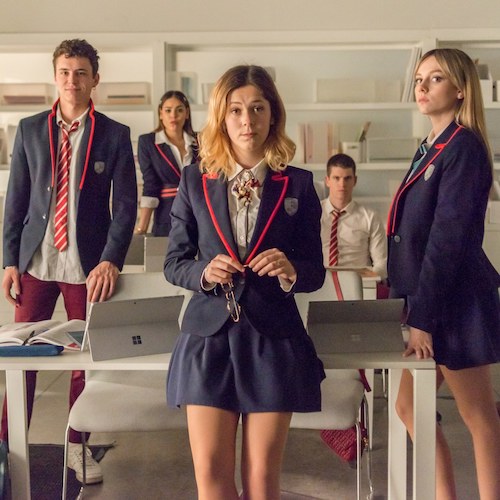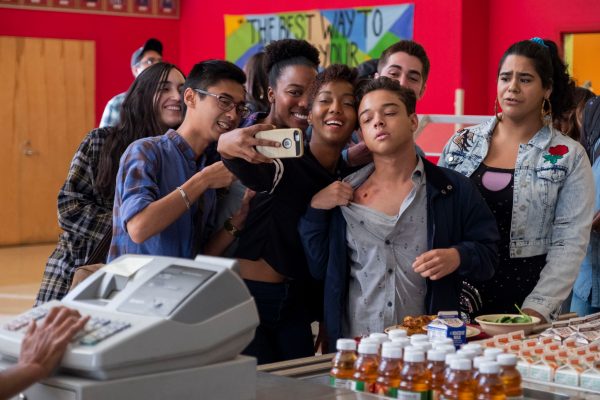TV Review: “On My Block” and “Elite” — Keeping It Real
By Saloni Gajjar
Both shows feature characters who are forced to grow up and deal with real-world hardships (including…death) too young.

Netflix’s Elite begins its third season this month.
“When are we ever just gonna get to be teenagers?” laments an exasperated Ruben Martinez (Jason Genao) less than five minutes into the premiere of the upcoming third season of On My Block, a Netflix original teen dramedy. The show, set in fictional Freeridge, California, is about four high-schoolers who grew up in a neighborhood rife with gang wars. Netflix has become the unexpected go-to for a plethora of these young adult television shows, whose resurgence on the streaming platform began in 2016 with Stranger Things, but has since expanded with dark dramas like 13 Reasons Why and The Society, bizarre comedies like The End of the F***ing World and Daybreak, and coming-of-age tales like Atypical and Sex Education.
Netflix has provided a wholesome home for authentic yet accurately diverse storytelling, a commitment reinforced by On My Block and Elite. The third season of each will drop on March 11 and 13, respectively. The two shows could not be more different, at least tonally, yet they both blend a variety of thorny issues — class differences, poverty, racial injustice, and LGBTQ themes — into engaging plot lines. The programs have found a way to cater to the perspectives of a younger audience while also entertaining (and educating) the millennial and older generations.
On My Block hails from co-creators Eddie Gonzalez, Lauren Iungerich, and Jeremy Haft, and features a primarily Latinx cast. Elite, a sexy, suspenseful thriller, comes from Spain; it was co-created by Carlos Monte and Dario Madrona. The narrative centers around the (mostly) rich students of a private school called Las Encinas, who get caught up in a murder mystery. (Who knew? Death can really dampen the ideal youth experience.) Yes, the shows are binge-worthy but, more importantly, they do more than proffer a diverse cast portraying complex characters. Behind the scenes there are diverse writers and directors, and a commitment to authenticity that leads to unparalleled accuracy.
In the world of On My Block, Cesar Diaz (Diego Tinoco) is often pulled into the activities of Santos, the gang his older brother Oscar runs with. This complicates his on-and-off relationship with strong-minded Afro-Latina Monse (Sierra Capri). Meanwhile, Jamal (Brett Gray) is obsessed with finding $250,000, money that he believes is hidden in their neighborhood based on a 30-year-old rumor. Then there’s Ruben “Ruby” Martinez, who was the victim of gun violence in season one and suffered through PTSD in season two. In season three a family financial setback proves tough on the young boy. Each of these characters is battling demons on their own; they don’t have the necessary support from society. Of course, some are trying to escape the neighborhood especially Monse who decides to attend a private all-girls school far away. On My Block does a fine job of focusing on its characters’ racial and sociopolitical problems leavened with lighthearted moments of friendship, romance, and comedy.

Netflix’s On My Block‘s third season begins this month.
Similarly in Elite, we start off with three kids from working-class families — Samuel (Itzan Escamilla), Nadia (Mina El Hammani), and Christian (Miguel Herran) — who win a scholarship to attend Las Encinas. Almost immediately, they are mocked because they’re not nearly as well-to-do as their classmates. In season one, the death of a student named Marina puts everyone under the police microscope, especially Samuel and his older brother Nano because of their background. Nadia is extremely bright but comes from a strict religious family; she wears a hajib (a cultural Muslim headgear) to school. The discrimination that she feels makes her remove it at school, briefly, to avoid the taunts. To its credit, Elite shows us how Nadia thrives as a student and succeeds in her classes. We also see her shed, at a level at which she is comfortable, her romantic and sexual inhibitions.
Every season of Elite starts off with a major crime, which becomes the narrative spine for its episodes. The premise is unrealistic, but it offers the writers a quick way to go beyond the show’s superficial attractions, such as its good-looking cast in their fancy uniforms. Nothing like crime to connect the doings in posh mansions with the fears in mid-sized apartments. Nadia’s brother Omar is a closeted gay man who hooks up with another Las Encinas student named Ander. Their dynamic is heartfelt: the relationship faces lots of obstacles, including Omar’s orthodox father. Ultimately, Elite serves up a sweet LGBTQ love story that exists not just to prop up a cause but to grapple with thorny issues, such as parental guidance, acceptance, and self-respect.
Both shows feature characters that are forced to grow up and deal with real-world hardships (including…death) too young. Yes, the usual teenage rituals are present and treated with empathy and fun: first kiss, first dance, first date, and even a quinceañera. But they are more often than not marred by authentic complications and vicissitudes. Elite, even though it is set in Spain, proffers elements of popular culture in the form of preppy Gossip Girl and Riverdale costumes as well as mean girl tropes. But the show also examines Islamophobia, class structure, and homophobia. It is that drive toward authenticity that makes these shows so valuable, and credit for that must go to the writers for On My Block and Elite. Francesca Gailes, Jacqueline Gailes, Sonia Kharkar, and Eddie Gonzalez, among others, are actively searching for ways to draw on cultural specifics, ranging from bilingual dialogue to cultural festivities, that add depth to what could have been your average (bland) teen drama.
Because they fall into the young adult category, On My Block and Elite invite charges that they are escapist television. That isn’t a problem, given that they examine the trials and tribulation of inclusion through a much-needed lens of diversity and youthfulness. The drawback for both is an overdependence on a stereotypical central conflict that becomes tedious: each season the kids at Las Encinas are embroiled in a crime or the Freeridge kids are pulled into battle against gang leaders. The flip side is that the shows try to pack in too many social concerns, which makes for very convoluted plot lines. Also, the effort to maintain viewer attention puts all the examined issues on the same level — superficiality is inevitable. Still, in their upcoming third seasons, On My Block and Elite continue to deal with cultural, social, and economic quandaries in ways that eschew the preachy: thanks to witty writing, solid performances, and compelling character development.
Saloni Gajjar is an entertainment and culture writer whose work can also be seen in A.V. Club, Mashable, Complex, Character Media, Brown Girl Magazine, and Interview Magazine. She is passionate about television and enjoys writing analytical reviews and fun takes about the medium. Her portfolio can be found on Contently.
